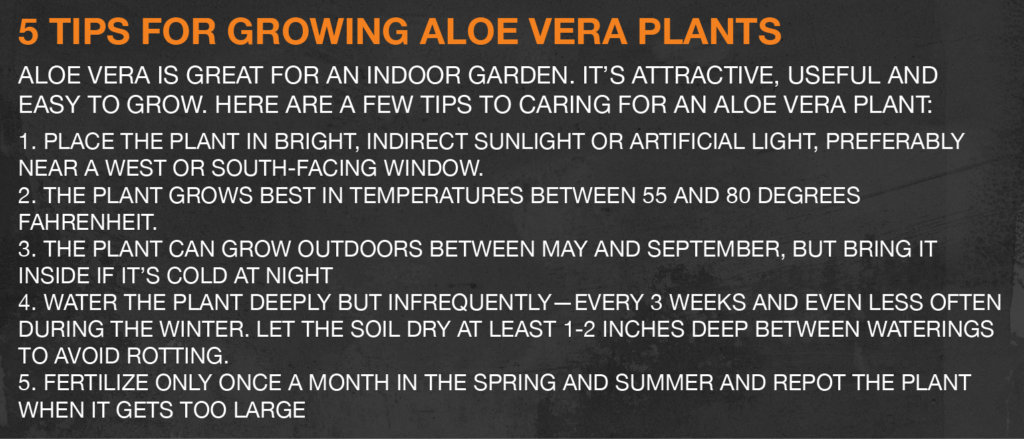Have You Ever Tried Aloe Vera Extract? Here’s Why You Should
by James Denlinger Digital Marketing StrategistWhat is Aloe Vera Extract?
Aloe vera is a succulent plant and for ages medical practitioners used the extract as a natural healing agent. Although there is no medical evidence that it can cure, treat or prevent any disease or health condition, medical journals suggest that the aloe vera plant may have natural restorative properties. For example, Dr. Richard Harris, M.D., Pharm D acknowledges its “antioxidant effects” and potential to “[reduce] inflammation” and support wound healing.
The green dagger-shaped leaves contain a clear gel, which is 96% water. The remaining 4% contains 75 different vitamins, minerals, amino acids and enzymes. The genus Aloe grows in temperate and subtropical climates. It is also grown commercially.

History of Aloe Vera
Records acknowledge its use in medicine and health care as far back as the 4th century B.C. and it’s referenced in Greek, Egyptian and Roman era writings. The word “Aloe” comes from the Arabic word “alloeh” or the Herew word “halal,” which translates into a bitter shiny substance. And the word “vera” means “real” in Latin.
Ancient Greek doctors collected the aloe plant from the island of Socotra in the Indian Ocean. According to records, people in the ancient world called it the “desert lily” and the “plant of immortality.” Ancient Egyptian stone carvings depict the plant as funeral gifts for deceased pharaohs and the Hindu people called it the “silent healer,” believing it grows in the Garden of Eden.
Aloe vera extract was common in Chinese culture for addressing sinusitis and other skin conditions. Aloe vera was also used as part of Ayurveda, “the ancient Indian science of health and life.” Those who practiced Ayurveda considered it “Vera rasayana” or “the rejuvenator of the organism.” People have used the plant throughout history and still acknowledge its potential benefits today.
What is Aloe Vera Extract Used for?
According to research, aloe vera potentially benefits both internal and external health. Its clear gel and yellow latex are popular ingredients in several different health products. The gel comes from the inner part of the plant and the latex comes from under the skin. Most of the time people use the gel as a topical for the skin and take the latex orally. Some of its common uses include:
- Skin health
- Hair health
- Digestion
Although there is research on aloe vera extract and its potential healing properties, it’s important to see a doctor for approval, diagnoses and accurate medical information before taking any supplements.
 PIN IT
PIN ITAddressing Skin Health
Healing Wounded, Burned or Irritated Skin
Aloe vera extract as a gel may relieve pain from mild burns, small cuts, abrasions and skin irritation. It may also help relieve itching and swelling. But how does it work?
According to Dr. Harris, “Aloe vera increases the water content in the stratum corneum of the skin. Dry skin can make the skin look dry, flaky and tight. Aloe… increases skin elasticity, hydration and collagen content while also reducing water loss. Aloe vera may also help to reduce inflammation.” Dr. Richards also explains that the aloe vera plant has natural anti-inflammatory and antiseptic properties that may promote circulation and prevent bacteria growth.
The plant contains certain chemical compounds responsible for its wound-healing potential:
- Polysaccharides – increase cellular movement
- Glycoproteins – relieve pain and help control the inflammatory response
“Salicylic acid and carboxypeptidase [in the plant] inhibit bradykinin production, which decreases pain,” Dr. Harris explains. “Mannose 6 phosphate and other polysaccharides present in aloe vera may help improve” the skin’s resistance to tension “by stimulating fibroblast growth factor and… collagen production… [to promote] wound healing.”
Soothing Acne & Other Skin Conditions
As an ingredient in beauty products from facial cleansers to hand sanitizers, aloe vera extract may also help address other skin conditions like acne, psoriasis and dermatitis. Research indicates the plant has antioxidants and vitamins for the skin, as well as antibacterial and astringent properties. It has anthraquinone, saponins and salicylic acid that may be beneficial for the skin.
According to Dr. Harris, saponins and anthraquinone help reduce inflammation, regenerate skin cells and may help restore the skin to remove acne scars. Saponins may also help eliminate bacteria and unclog the pores and salicylic acid helps restore pH levels in the skin.
 PIN IT
PIN ITSupporting Hair Health
In addition to the chemicals that we mentioned earlier, aloe vera extract also contains substances that may be beneficial for hair health. Research claims that it may help with dandruff, inflammation and irritation on the scalp. Dr. Harris explains its benefits to hair health in three ways:
- Increasing blood flow to the scalp and increasing nutrient delivery
- Reducing inflammation
- Removing excess oil from the hair
For example, it contains vitamin C, vitamin A, vitamin E, vitamin B12 and folic acid that help support cell turnover and growth.
Research also indicates that aloe has cooling properties that may help soothe irritation on the scalp, similar to its healing abilities for the skin. For example, it may help heal sun damage on the scalp that can damage the hair and improve collagen content. Another study suggests the proteolytic enzymes in the aloe vera extract may help repair dead skin cells on the scalp and reduce hair shedding.
Supporting Digestion
There are also commercial beverages that contain aloe vera extract. Consuming the plant’s enzymes may benefit digestion by helping break down sugars and fats. The compounds may help with nutrient absorption and reduce irritation in the stomach and intestines.
Studies suggest that the substances in aloe vera may help relieve constipation and pain associated with irritable bowel syndrome and ulcerative colitis. Dr. Harris explains that aloe vera has natural antioxidant activities that may reduce inflammation in the digestive system.
How to Use Aloe Vera Extract
Aloe vera extract is available as a topical and oral supplement. The recommended serving size for aloe vera powder is 1,000 mg per day with 8 oz. of water. Before you start taking the supplement, make sure to consult a doctor for approval first.
If you are fortunate enough to have a green thumb, you can also grow your own aloe vera plant to get fresh aloe vera gel and latex.
 PIN IT
PIN ITPossible Side Effects of Aloe Vera
It’s likely safe to use as a topical for skin irritation and it is likely safe to drink in the short-term. However, it may cause side effects, especially in high doses:
- Low blood sugar (hypoglycemia)
- Burning and itching of the skin
- Stomach pain and cramps
- Diarrhea
- Kidney problems
- Blood in the urine
- Weight loss
- Muscle weakness
Warnings & Safety Precautions
It may cause allergies as a topical, so start by testing the gel on a small patch of skin before you use it. The supplement may be unsafe for pregnancy and breastfeeding, so it’s best to avoid it.
It may also be unsafe for patients with diabetes because it may lower blood sugar and patients with intestinal conditions. The latex may irritate the bowels. To potentially avoid side effects, make sure to consult a doctor before using aloe vera extract.
Where to Buy Aloe Vera Extract
You can purchase aloe vera extract supplements at BulkSupplements.com. The company is an industry-leading manufacturer and distributor for pure dietary supplements. BulkSupplements.com is not just a consumer brand. It also supplies pure ingredients to other brands that distribute food and other supplement products. All products at BulkSupplements.com are manufactured and tested according to current and proper manufacturing practices.
Are you interested in trying aloe vera extract as a dietary supplement for its potential to support healthy skin and hair, as well as heal wounds and regulate digestion? Contact BulkSupplements.com to place an order today.
Bottom Line
Ancient cultures all over the world used aloe vera extract for its potential healing properties. Today, there are a number of studies that support its potential value in healing skin wounds, burns or irritation. Aloe vera may help support hair health by reducing inflammation on the scalp and reducing shedding. Its antioxidant properties may also help relieve constipation, regulate digestion and reduce inflammation. Make sure to consult a doctor before taking aloe vera as a supplement. It may cause side effects, although there are studies that seem to support its use.
Sponsor Ads
Created on Apr 18th 2020 17:47. Viewed 413 times.




